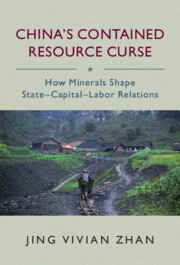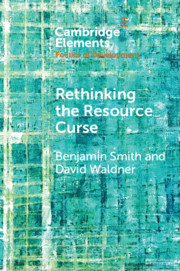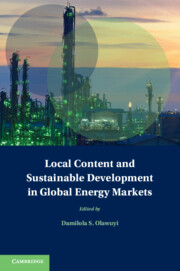36 results
The Devil and Florentino: Specters of Petro-Populism in Venezuela
-
- Journal:
- Comparative Studies in Society and History / Volume 66 / Issue 3 / July 2024
- Published online by Cambridge University Press:
- 01 April 2024, pp. 474-500
-
- Article
-
- You have access
- Open access
- HTML
- Export citation
7 - Conclusion
-
- Book:
- Fueling Sovereignty
- Published online:
- 14 March 2024
- Print publication:
- 21 March 2024, pp 193-210
-
- Chapter
- Export citation
4 - “Bolivarian” and Left-Wing Populism in Latin America
-
- Book:
- Democracy's Resilience to Populism's Threat
- Published online:
- 11 January 2024
- Print publication:
- 25 January 2024, pp 117-158
-
- Chapter
- Export citation
Land Abundance, Openness, and Industrialization
-
- Journal:
- World Trade Review / Volume 22 / Issue 3-4 / October 2023
- Published online by Cambridge University Press:
- 05 September 2023, pp. 312-322
- Print publication:
- October 2023
-
- Article
-
- You have access
- Open access
- HTML
- Export citation
Oil discoveries and political windfalls: evidence on presidential support in Uganda
-
- Journal:
- Political Science Research and Methods / Volume 11 / Issue 4 / October 2023
- Published online by Cambridge University Press:
- 07 June 2023, pp. 903-912
-
- Article
-
- You have access
- Open access
- HTML
- Export citation
Oil discoveries and gender inequality
-
- Journal:
- Journal of Demographic Economics / Volume 90 / Issue 1 / March 2024
- Published online by Cambridge University Press:
- 25 July 2022, pp. 1-30
-
- Article
- Export citation
1 - Minerals and the State–Capital–Labor Triad
-
- Book:
- China's Contained Resource Curse
- Published online:
- 24 March 2022
- Print publication:
- 31 March 2022, pp 1-37
-
- Chapter
- Export citation

China's Contained Resource Curse
- How Minerals Shape State-Capital-Labor Relations
-
- Published online:
- 24 March 2022
- Print publication:
- 31 March 2022
2 - The Ecology of War and Peace
- from Part I - Concepts, Theories, and Debates
-
- Book:
- The Ecology of War and Peace
- Published online:
- 03 September 2021
- Print publication:
- 16 September 2021, pp 31-59
-
- Chapter
- Export citation

Rethinking the Resource Curse
-
- Published online:
- 01 April 2021
- Print publication:
- 22 April 2021
-
- Element
- Export citation

Local Content and Sustainable Development in Global Energy Markets
-
- Published online:
- 05 March 2021
- Print publication:
- 04 March 2021
5 - Africa’s Economy, 1960–2000
-
- Book:
- Africa since Decolonization
- Published online:
- 07 January 2021
- Print publication:
- 21 January 2021, pp 90-115
-
- Chapter
- Export citation
12 - The Monoeconomies: Issues Raised by Heavy Dependence on Commodity Production and Exports
-
- Book:
- A Handbook of Primary Commodities in the Global Economy
- Published online:
- 06 November 2020
- Print publication:
- 26 November 2020, pp 256-287
-
- Chapter
- Export citation
4 - Fossil Fuels
-
- Book:
- A Handbook of Primary Commodities in the Global Economy
- Published online:
- 06 November 2020
- Print publication:
- 26 November 2020, pp 72-90
-
- Chapter
- Export citation
BUSINESS AND LOCAL TAXATION IN THE PHILIPPINES
-
- Journal:
- Journal of East Asian Studies / Volume 20 / Issue 3 / November 2020
- Published online by Cambridge University Press:
- 10 November 2020, pp. 375-402
-
- Article
- Export citation
Ghana's petroleum industry: expectations, frustrations and anger in coastal communities
-
- Journal:
- The Journal of Modern African Studies / Volume 58 / Issue 3 / September 2020
- Published online by Cambridge University Press:
- 20 November 2020, pp. 397-424
- Print publication:
- September 2020
-
- Article
- Export citation
Threshold regressions for the resource curse
-
- Journal:
- Environment and Development Economics / Volume 25 / Issue 6 / December 2020
- Published online by Cambridge University Press:
- 10 August 2020, pp. 583-610
-
- Article
- Export citation
1 - The Puzzle of Extractive Resource Nationalization
-
- Book:
- Power Grab
- Published online:
- 31 March 2020
- Print publication:
- 02 April 2020, pp 1-37
-
- Chapter
- Export citation
4 - Human Capital
- from Part II - Problematic Explanations and Solutions
-
- Book:
- Property, Institutions, and Social Stratification in Africa
- Published online:
- 27 March 2020
- Print publication:
- 26 March 2020, pp 118-155
-
- Chapter
- Export citation
Fading local effects: boom and bust evidence from a Peruvian gold mine
-
- Journal:
- Environment and Development Economics / Volume 25 / Issue 2 / April 2020
- Published online by Cambridge University Press:
- 18 October 2019, pp. 182-203
-
- Article
- Export citation


